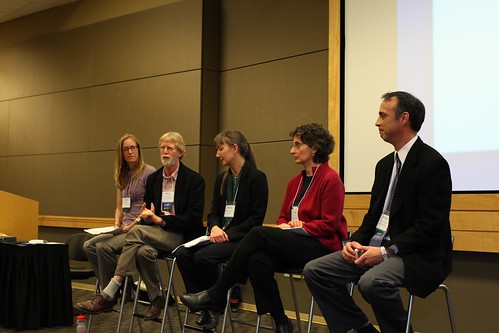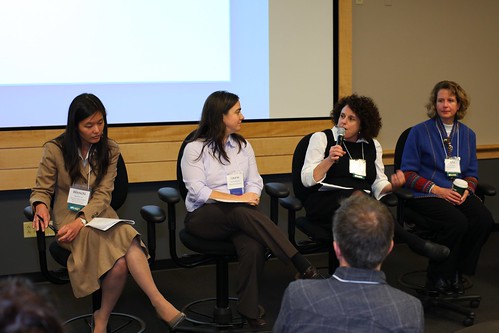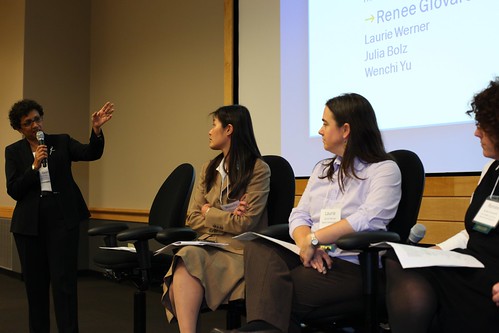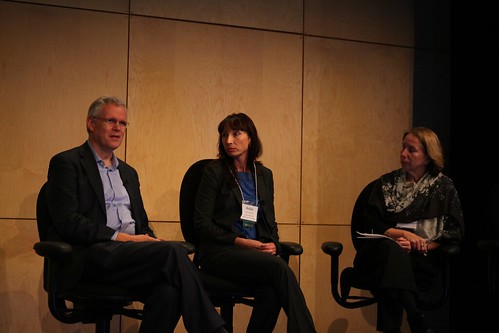Posted on November 15, 2010

Submitted by Sarah Mosely
Moderator Dr. Lisa Graumlich of the University of Washington’s College of the Environment led discussion with these well-informed panelists, practitioners affiliated with notable organizations – such as Seattle University, the Woodland Park Zoo, The Nature Conservancy, Water for Humans and Water 1st International – doing work to improve quality of and access to water, sanitation and conservation programs in communities throughout the developing world. Panelists discussed achieving sustainable and scalable results from their programs stems from a common set of activities: strong local partnerships; working with governments at the local level; gaining trust within the communities; and strengthening systems for monitoring, evaluation and communication, which is at the core of the work discussed. The panelists largely agreed that major challenges they all face include: a difficult economic environment; lack of sustained funding; chaos caused by redundant organizations working in the same areas; and first-world behaviors, namely consumerism. Overall, the panelists detailed their thoughtful approaches to program planning and implementation, and stressed that strong partnerships with local actors and government have been vital to success.
Panelists:
Kari Vigerstol, Hydrologist, Freshwater Program, The Nature Conservancy
Rick McKenney. Exec. Director, Water for Humans
Marla Smith-Nilson, Founder & Executive Director, Water 1st International
Lisa Dabek, Senior Conservation Scientist, Director of the Papua New Guinea Tree Kangaroo Conservation Program, The Woodland Park Zoo
Phillip Thompson, Engineers Without Borders and Associate Professor and Chair, Environmental and Civil Engineering, Seattle University
Moderator: Lisa J. Graumlich, Dean and Virginia Bloedel Professor, College of the Environment, The University of Washington
Posted on November 15, 2010

Submitted by By Yvette Gerrans
Just after lunch, and 100+ women and a minority of men drift in with expectation. We’re wanting to talk about investing in women and girls—why it’s needed, why it works, and how to do it well. Sessions like this have always felt like a long-distance meeting of “the sisterhood” to me, we women talking about women.
Geeta Rao Gupta (Bill & Melinda Gates Foundation) brings strength, warmth, humor and credibility in her opening comments. She talks about how women’s status depends on capabilities (health, education, nutrition), opportunities (economic, political), and concerns about safety (whether they’re actually beaten, or fear that they might be). “A lot of women live in fear of being physically beaten, and a lot of them make decisions about what they can and cannot do, and where they can and cannot go, based on that fear.” A few other stats that astound me but also project hope:
– Women do 66% of the world’s labor in return for less than 5% of its income.
– For every one year increase in education of women of reproductive age, child mortality has decreased by 9.5%. And, providing girls one extra year of education beyond the average boosts their eventual wages by 10-20%.
– A child’s probability of survival is increased 20% when household income is controlled by the mother rather than the father.
By now the room is full to overflowing, more chairs have been brought in, and we’re well on our way to a good discussion.
And a few highlights from the long and engaged conversation:
– Education for girls yes—but that’s not enough, and there’s a lot of poor education out there. What else is needed? Yes, you have to not only built the structure, but strengthen other elements as well. However, research in Northern Nigeria showed that girls who went to school—even if quality of schooling was bad, and they’d been there only two years, participated more in decision-making in the household than those who’d never been out of the home. In fact, not just school—those who had to step out of the home and go somewhere (to a community organization or wherever), used her power more in the home than those who didn’t. Of course that’s not enough, but start with what’s in front of you. Also, work at multiple levels. For example, in pursuing primary education nobody paid attention to what happens after primary education. So now parents are questioning why to give up labor of child to get the same job they would’ve anyway. So “do what you can” is partly correct, but also work at multiple levels.
– Often in past, construction of schools has been somewhat of an “edifice complex.” What about after that? It’s a challenge in working with community to develop internal things, maintain facilities. Ayni uses the metaphor that it “takes two hands to clap”—if the fund-raising happens without the other hand of community engagement, it will eventually stop. And vice versa. In one creative example in India, one organization worked with community around the question: Whose school-house is it? Government’s. Whose children go there? Now whose schoolhouse is it? On schoolhouse door, now have a paper that says: “This school-house will have: 8 benches, x chalk pieces, x slates, when is teacher to be absent / present.” So the community can now hold the government accountable, and they do.
– How do organizations “deepen” the conversation on these issues, especially about such personal / relational issues in the family. Can’t do it from outside. We talk about women’s empowerment—but we actually don’t empower women, they empower themselves. You can’t save the world. You can do a few things here and there to make it a better place, and hope that people take advantage of it. Can hear what they think is important and shift the resources a bit with whatever lever you have.
– Years ago, early in gender work we tried to get every individual in USAID or another agency to believe that women and girls were important. After years of trying to do that and failing, we finally decided we don’t really care what their attitudes are. Rather, we want them to see the importance of this issue to their work. In so many fora, men stand up and say: “I just want you to know, I treat my daughters and wife well.” This topic is somehow threatening to them. Geeta responds “Frankly, my dear, I don’t give a damn.” (channeling Ret Butler in Gone with the Wind). The point is, we’re here to help you do your work better, that’s it.

In closing, the final question Geeta posed to the panelists was “what do you want every individual in this room to do?”
– Julie: Write your senator or congressman and tell them to make it a priority for international aid development into things like education, land reform, microfinance—those fields that affect women.
– Renee: When you hear about projects, ask people: what does your project do for women?
– Laura: As you hear about projects, ask where’s it coming from? Is it being imposed or has the community bought in on it. Hear what the people want themselves.
– Wenchi: Listen and think how to raise the value of girls—since that’s the root cause of all discrimination against women and girls. How do we change the societal views?
– Geeta: 1) Convention for the elimination of all forms of discrimination against women is being heard in the senate on Thursday at 2pm, for the first since 2002. So go to: CEDAW2010.org and sign on. The US is one of 3-4 countries that hasn’t ratified CEDAW (along with Sudan, Libya, Somalia—that’s the company we’re keeping). 2) Give—of your time, expertise, and money. Choose an organization you adore, or a leader that’s struggling so hard but doing good work.
Panelists:
Julia Bolz, Founder and Board President, Ayni Education International
Renee Giovarelli, Director, RDI’s Global Center for Women’s Land Rights
Laurie Werener, Director of Program, Agros International
Wenchi Yu, Senior Policy Advisor, Secretary’s Office of Global Women’s Affairs, U.S. Department of State
Moderator: Geeta Rao Gupta, Senior Fellow, Bill & Melinda Gates Foundation
Posted on November 15, 2010
Stephen E. Hanson, professor and vice provost for Global Affairs, at University of Washington discussed the policy recommendations developed by Global Washington in partnership with experts in Washington State. They came up with four principles to increase U.S. foreign assistance effectiveness. These include: transparency and accountability to U.S. taxpayers and international beneficiaries; coherence and coordination across efforts and actors to ensure development goals are prioritized; local ownership of policies by those who will be most affected by them; and targeting populations most in need of aid. Hanson also stressed the need for “patient” metrics because global issues are enormous and their solutions are multi-generational. Most initiatives need time to achieve their goals as well as time for those achievements to be measured accurately.

These policy recommendations set the context for the panel on “The Changing Environment of International Development” where Sam Worthington, President & CEO of InterAction, and Anita Sharma of the United Nations Millennium Campaign discussed the challenges, their recommendations, and the current needs of effective public/private partnerships in global development.
Both panelists discussed the lack of funding and support for foreign aid in our current economic climate. While many governments have pledged aid to support the UN Millennium Development Goals, many have yet to make good on these pledges, explained Sharma, and there is a real need for non-governmental entities and constituencies to continue to support global aid efforts. The U.S. security budget would do well to include international development efforts as a matter of national security.
Worthington underscored the shift of foreign aid from economic assistance toward a focus on economic growth in developing countries. He stressed that the biggest challenge to aid, aside from fiscal constraints, is identifying governments who trust their populations to take part in planning their own development. Part of this development will have to come from private entities, which Worthington argued are more focused on the people who will receive assistance, whereas aid from government entities tends to focus first on the relationship with the nation-state before its people.
Submitted by Nina Carduner





